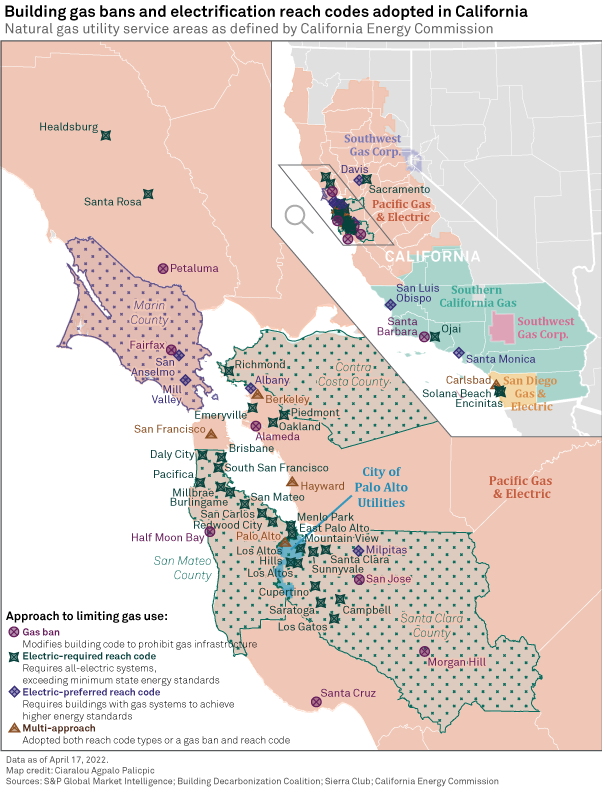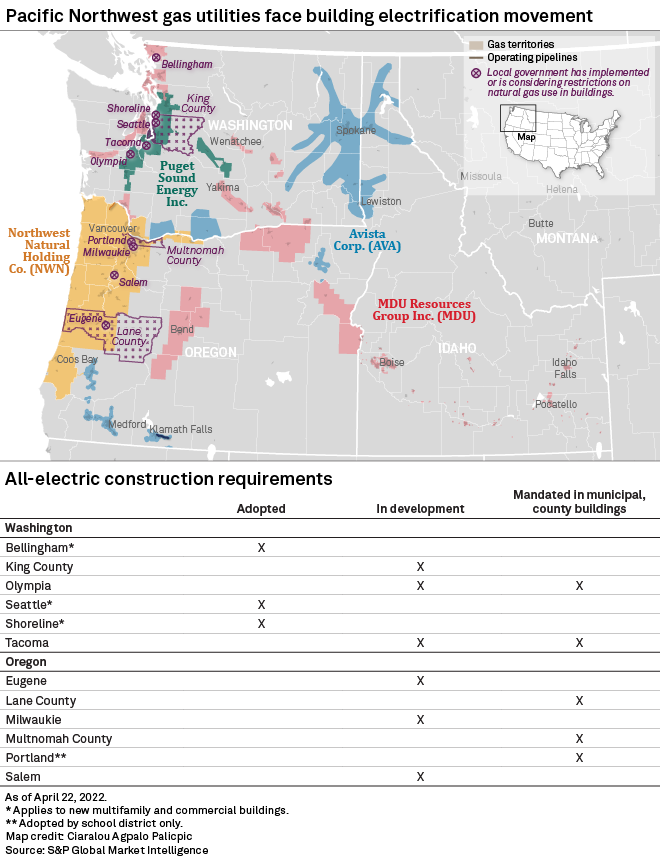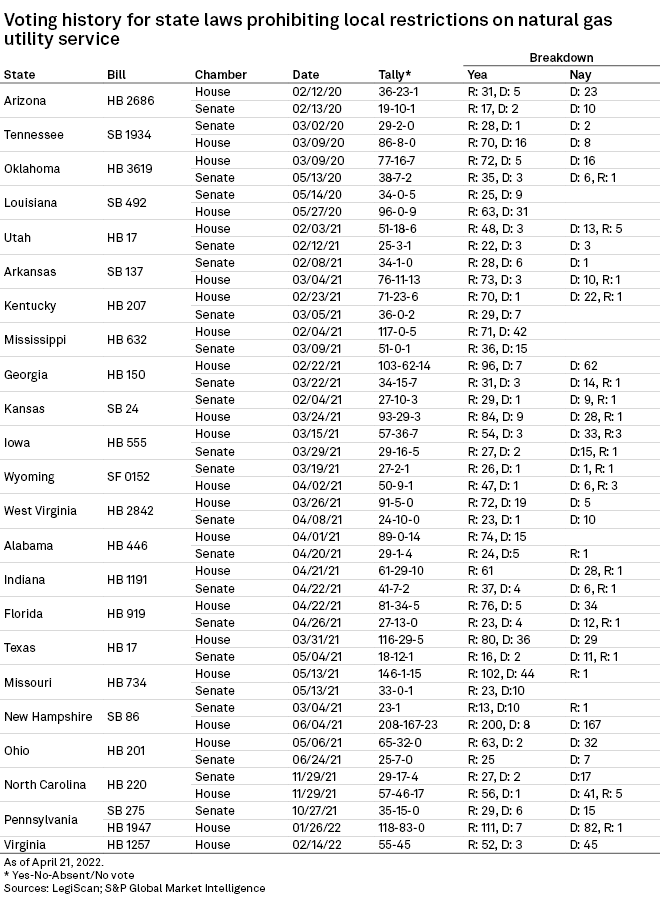S&P Global Offerings
Featured Topics
Featured Products
Events
S&P Global Offerings
Featured Topics
Featured Products
Events
S&P Global Offerings
Featured Topics
Featured Products
Events
Banking & Capital Markets
Economy & Finance
Energy Transition & Sustainability
Technology & Innovation
Podcasts & Newsletters
Banking & Capital Markets
Economy & Finance
Energy Transition & Sustainability
Technology & Innovation
Podcasts & Newsletters
S&P Global Offerings
Featured Topics
Featured Products
Events
26 Apr, 2022

|
Cities and counties in the San Francisco Bay Area continued to expand the reach of building electrification requirements through the start of 2022. |
Local lawmakers continued to advance building electrification mandates up and down the West Coast of the U.S. in 2022, while a countermovement to prohibit the policy hit resistance after expanding rapidly in 2021.
In a major development, Washington became the first state to adopt statewide all-electric construction requirements in new commercial and multifamily buildings. The April 22 vote by the State Building Code Council followed the expansion of local gas bans and electrification codes in California, Oregon and Washington in recent months.
East Coast efforts to restrict gas use at the state level were less successful in the opening months of 2022.
At the federal level, the Biden administration continued to advance its building electrification agenda with a $1.8 billion program to help state and local governments develop building performance standards. Congressional Democrats also renewed their push to offer federal building electrification rebates.

Calif. counties expand scope of building electrification
In the final months of 2021, Los Angeles took steps toward building electrification, as local lawmakers tasked city staff with developing a plan to decarbonize buildings in the nation's second most populous city. Meanwhile, the policy expanded to at least 54 towns, cities and counties across California.
Contra Costa County's Board of Supervisors on Jan. 18 adopted a reach code that requires new residential, hotel, office and retail construction in the county's unincorporated areas to be all-electric. A reach code "reaches" beyond the state's mandatory codes. Unincorporated areas are located outside of cities where the county typically provides government services, including building permits.
About 15% of the county's 2020 population of nearly 1.2 million people lives in unincorporated areas. Richmond is the only city in Contra Costa County that has adopted an all-electric energy code for new construction. However, city councilors said more towns and cities were considering the policy and looking to the board of supervisors for guidance.
Additional electrification mandates in Contra Costa County would expand the policy's reach in the San Francisco Bay Area, which accounts for the vast majority of California's prohibitions on new gas hookups. Santa Clara County, which has the most building electrification mandates of any county in California, also extended the policy to unincorporated areas on Dec. 14, 2021. According to the county, 8% of its population of nearly 1.8 million people lives outside cities.

Lawmakers in Half Moon Bay in neighboring San Mateo County pushed the boundaries of previous California gas bans. In addition to requiring new buildings to be all-electric, a city ordinance adopted on Dec. 21, 2021, included electrification requirements for existing buildings.
Major remodels, which are defined as renovations or additions of 500 square feet or more, will require the owner to convert the entire building to all-electric systems and appliances. For minor remodels, owners will have to convert to electric equipment in the space being renovated.
Facing cost concerns from residents, the council shelved a provision that would have required property owners to replace gas appliances with electric alternatives when they break down. However, the ordinance requires owners to opt for electric appliances and systems if the equipment is a new addition to an existing building. The ordinance also allows the council to review and revise the requirements annually.
Finally, Solana Beach became the latest city in Southern California to adopt an all-electric reach code on Dec. 8, 2021.
Wash. cities move gas restrictions forward
The ordinance prohibits gas space heating and restricts electric resistance heating in new construction, leaving builders largely reliant on electric heat pumps. It mandates hot water heat pumps in new multifamily buildings and hotels and requires outlets that can accommodate electric appliances.
The ordinance also includes rooftop solar requirements and more stringent energy efficiency standards than those in the state commercial code.
Meanwhile, lawmakers in Olympia, Wash., resolved to electrify municipal buildings and explore citywide electrification mandates, similar to a resolution passed by Tacoma, Wash., in April 2021.
In a Jan. 18 resolution, the Olympia City Council directed the city manager to use all-electric construction in new city buildings and renovations, with limited exemptions. The resolution also requires all-electric systems in city-funded construction projects and renovations. It additionally ordered the city manager to schedule meetings to discuss citywide electrification of new buildings and report on the feasibility of retrofitting municipal buildings that combust fossil fuels. The council held its first workgroup on citywide electrification on March 8.

Oregon building electrification gathers momentum
In Oregon, the Eugene City Council advanced its debate on banning gas use in new buildings. Lawmakers likely have authority to prohibit gas hookups in new buildings, city staff reported during an April 13 work session. The finding was important because state codes have preempted some cities' building electrification mandates.
State building codes do not protect access to gas utility service in Oregon, so a simple amendment to Eugene's environmental and health code prohibiting new hookups would likely hold up, staff said. However, if lawmakers include a variety of exemptions, the ordinance would be more likely to conflict with state code, they said. Eugene would then have to seek permission from the state to implement the ordinance.
Lawmakers once again declined to order city staff to draw up ordinance language. They instead agreed to hold another work session before July 31, during which staff will answer questions raised by councilors. Several sought analysis on the policy's economic impact, regional electric grid capacity and electrification incentives for low-income households. Councilors have yet to decide whether to require all-electric construction or prohibit specific fuels including natural gas.
On April 12, the board of Lane County, which includes Eugene, approved the second phase of its Climate Action Plan, including an agreement to construct county buildings without fossil fuels. The city council in Salem, Ore., on Feb. 14 also voted to accept a Climate Action Plan that includes building electrification mandates among 180 possible strategies. The council also appointed a subcommittee that will make recommendations for implementing the strategies.
Elsewhere, the Portland Public Schools Board voted unanimously to prohibit gas-fired heating equipment in new construction and renovations within the school district and to phase out fossil fuel equipment in all existing buildings by 2050. The provisions were part of the school district's new climate justice and sustainability policy. In April 2021, commissioners in Multnomah County, which includes Portland, voted to require all-electric construction in county buildings.
Attempts to preempt gas bans hit headwinds
Legislation designed to prohibit towns and cities from restricting gas use in buildings faced roadblocks in several states during the first quarter. This came after North Carolina Gov. Roy Cooper, a Democrat, vetoed a preemption bill passed in the Republican-controlled legislature.
An attempt to preempt local gas bans in Virginia was short-lived. The Democrat-controlled Senate stripped the provisions from House Bill 1257, passed in the Republican-controlled House of Delegates. The only part of the bill that survived outlined the process for a municipal gas utility to sell its assets. The provision stemmed from a Richmond City Council resolution that found the city's operation of Richmond Gas Works was in conflict with its climate goals.
In Colorado, Republican Rep. Dan Woog's second attempt to preempt building gas bans failed. As in 2021, Democrats outvoted Republicans in the House Energy and Environment Committee on Feb. 3, blocking House Bill 1020 from advancing to the full chamber. Echoing the debate in Virginia, Democrats said the bill would hamstring local efforts to combat climate change. Woog focused on consumer choice and the cost of electrification to ratepayers.

A Nebraska preemption bill also failed to advance in the 60-day 2022 legislative session. The bill's sponsor, Sen. Joni Albrecht, developed an amendment to satisfy lawmakers concerned that local governments would lose authority to govern their own municipal utilities — a common provision in preemption bills — according to Brandy Johnson, regional community affairs manager at Black Hills Corp. However, the amendment arrived too late in the session, said Lisa Weeks, a legislative aide to Albrecht.
In Wisconsin, Senate and Assembly Republicans introduced preemption bills at the tail end of the legislature, which ran from January 2021 through March 2022. Lawmakers adjourned before the bills could gain traction. The sponsors will have to reintroduce them when the next legislative session begins in 2023.
Minnesota lawmakers revived a preemption bill that has been idle for about a year. The Senate Energy and Utilities Finance and Policy Committee voted to advance Senate File 2185 on March 16 and referred the legislation to the Local Government Policy Committee.
Gas bans also hit resistance at state level
State-level efforts to restrict gas use also encountered headwinds.
New York Gov. Kathy Hochul and state lawmakers struck a final budget deal that dropped a gas ban in new buildings, as well as updates to building codes and appliance efficiency standards. Both Hochul and the Senate included the provisions in their budgets, but they did not survive final negotiation with the Assembly.
Maryland climate legislation passed without a provision that would have required new buildings to meet space and water heating demand without fossil fuel combustion.
However, the Climate Solutions Now Act of 2022 declared that the Maryland General Assembly intends for the state to "move toward broader electrification of both existing buildings and new construction." The act directed Maryland's Building Codes Administration to develop recommendations for an all-electric building code and deliver a final report to the General Assembly's Legislative Policy Committee by Dec. 1, 2023.
Bay State gas ban backers were foiled once again as the Massachusetts Department of Energy Resources, or DOER, rolled out proposed energy code updates. The updates did not give towns and cities explicit authority to require all-electric new construction, prompting criticism that DOER ignored the legislative intent of the state's 2021 climate roadmap bill.
As a result, state lawmakers dialed up their threats to advance legislation to allow local gas bans. On April 14, the Senate passed legislation, Senate Bill 2819, that would allow up to 10 towns and cities to prohibit fossil fuel use in new buildings and renovations as part of a demonstration project overseen by DOER.
Underscoring the frustration, Massachusetts Attorney General Maura Healey blocked a second Brookline, Mass., gas ban over conflicts with state law. Brookline appealed the decision on April 26. Healey, a candidate for governor, on April 19 vowed to allow local gas bans, install 1 million heat pumps by 2030 and establish building emission standards if elected in November.
An effort to obtain authority to restrict gas use in buildings has moved forward more swiftly in Vermont. Republican Gov. Phil Scott on April 20 signed a bill that gives Burlington, Vt., authority to levy a fee on carbon emissions from new buildings that connect to natural gas infrastructure. The legislation clears a path for the Burlington mayor and city council to implement the policy.
S&P Global Commodity Insights produces content for distribution on S&P Capital IQ Pro.
